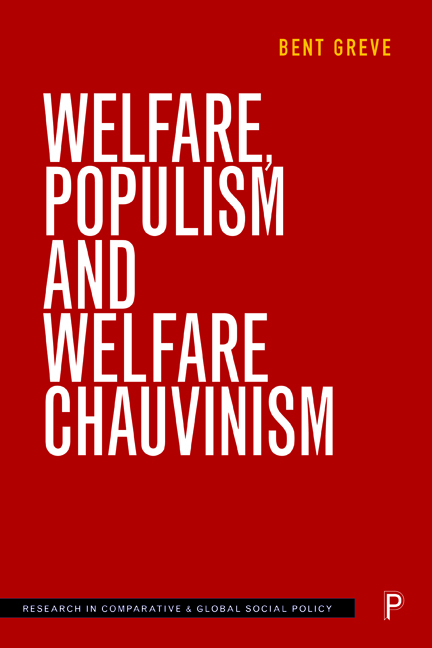Book contents
- Frontmatter
- Contents
- List of tables and figures
- Preface from the series editors
- Preface
- 1 What is it all about?
- 2 Basic concepts
- 3 Why inequality matters
- 4 Dualisation and the labour market
- 5 What form has the development in welfare spending taken?
- 6 Has social cohesion been eroded?
- 7 What do we know about citizens’ perception of the welfare state?
- 8 Populism, welfare chauvinism and hostility towards immigrants
- 9 Concluding remarks
- Index
Preface from the series editors
Published online by Cambridge University Press: 27 April 2022
- Frontmatter
- Contents
- List of tables and figures
- Preface from the series editors
- Preface
- 1 What is it all about?
- 2 Basic concepts
- 3 Why inequality matters
- 4 Dualisation and the labour market
- 5 What form has the development in welfare spending taken?
- 6 Has social cohesion been eroded?
- 7 What do we know about citizens’ perception of the welfare state?
- 8 Populism, welfare chauvinism and hostility towards immigrants
- 9 Concluding remarks
- Index
Summary
In a world that is rapidly changing, increasingly connected and uncertain, there is a need to develop a shared applied policy analysis of welfare regimes around the globe. Research in Comparative and Global Social Policy is a series of books that addresses broad questions around how nation states and transnational policy actors manage globally shared challenges. In so doing, the book series includes a wide array of contributions, which discuss comparative social policy history, development and reform within a broad international context. Initially conceived during a meeting of the UK Social Policy Association Executive Committee in 2016, the book series invites innovative research by leading experts on all world regions and global social policy actors and aims to fulfil the following objectives: it encourages cross-disciplinary approaches that develop theoretical frameworks reaching across individual world regions and global actors; it seeks to provide evidence-based good practice examples that cross the bridge between academic research and practice; not least, it aims to provide a platform in which a wide range of innovative methodological approaches, may it be national case studies, larger-N comparative studies, or global social policy studies can be introduced to aid the evaluation, design, and implementation of future social policies.
This monograph by Bent Greve tackles one of the most poignant challenges faced by many welfare states – the issue of rising anti-immigrant attitudes and, with it, populist parties. In this book, Greve asks the important question: why is it, in these times of growing inequality and polarisation of life chances across the population, that citizens are using their democratic power to vote for parties that reduce welfare and put themselves at greater risk? The book brings together a wide range of theoretical concepts drawn from the welfare attitudes and welfare state legitimacy literature, alongside a range of recent quantitative and qualitative data, to answer this question in greater depth. The main argument is that the rise in inequality and dualisation of the labour market observed across Europe has led to diminished trust not only between citizens and the state, but also amongst the population – an increase in attitudes of ‘us vs. them’.
- Type
- Chapter
- Information
- Welfare, Populism and Welfare Chauvinism , pp. xi - xiiPublisher: Bristol University PressPrint publication year: 2019



